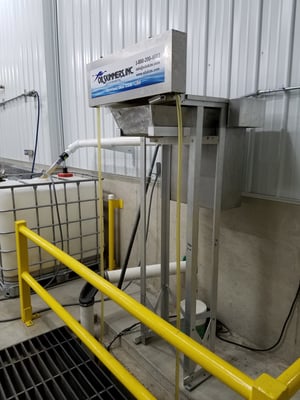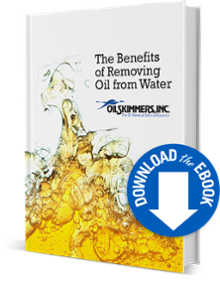 In just about every industrial process on earth, whether it’s making steel or cosmetics, food processing, mining, railroads, or construction, water plays an important role in a company’s operations.
In just about every industrial process on earth, whether it’s making steel or cosmetics, food processing, mining, railroads, or construction, water plays an important role in a company’s operations.
Similarly, in most, if not all of those same industries, oil plays some kind of role. It may be lubrication oil, fuel oil, or the process itself may consume or produce oil—such as in chemical plants and oil refineries.
Chances are, at some point, water comes into contact with oil.
In today’s world, the environmentally and economically conscious seek to recycle and reuse both water and oil. The very first step in any recycle or reuse process is to separate the oil from the water.
What most companies don’t often realize is that removing oil from wastewater doesn’t have to be a costly endeavor. In fact, many have found using oil skimming technology to remove oil from water can actually reduce costs.
Oil Skimming = Reduced Costs
Removing oil from water, whether process water or wastewater, is important for a number of reasons and can offer significant benefits such as:
- Reducing costs
- Generating new revenue
- Enhancing environmental responsibility
- Providing safer work environments
- Improving overall operations
It is important to remove oil as close to the point of origin as possible (where oil enters the wastewater stream). Why?
Removing oil before the wastewater stream “mixes” with oil-free water will greatly reduce the scope and associated costs of down-the-line wastewater treatment equipment. Oil tends to foul downstream filtration equipment, so the more the oil mixes with water, the bigger the scope of the eventual recycling task.
Thus, major opportunities to reduce costs by using skimming technology include:
- Increasing the potential to reuse water for production processes
- Reducing overall water consumption by extending the life of process water as well as coolant fluids
- Extending the life of, and reducing the maintenance required for, water and coolant filtration equipment
- Reducing the amount of chemicals needed to treat process water or wastewater
- Reducing costs associated with wastewater disposal
The two examples that follow highlight companies in the steel manufacturing and food production industries that use Brill® Tube Type Oil Skimming Systems, and as a result, have benefited from significant operational cost savings.
Use Case: Steel Manufacturer Saves Thousands
A steel manufacturer with a 148” plate mill and 86” hot strip mill saved approximately $400,000 per year by using an Oil Skimmers, Inc. oil removal system to recover 15,000 gallons of high-grade lubrication oil each month that was mixing with the cooling water.
Use Case: Food Producer Decreases Costs
A potato chip plant wanted to increase production by 20%, but needed a better solution for removing oil from the water that was used to wash its fryers. By installing an oil skimming system, the company was able to increase production as planned, reduce the amount of chemicals needed to treat the wastewater and decrease hauling costs for sludge removal by 30 percent.
Oil Skimmers Prove Their Worth
Regardless of the industry, oil skimmers have proven their worth when it comes to removing oil from wastewater in a variety of demanding applications.
Designed to improve overall operations while reducing costs, increasing revenue, aiding with environmental compliance and helping provide a safer work environment, a quality tube type oil skimmer offers continuous operation for an efficient, cost effective oil removal process.
To learn more about the benefits removing
oil from water, download the eBook today!


